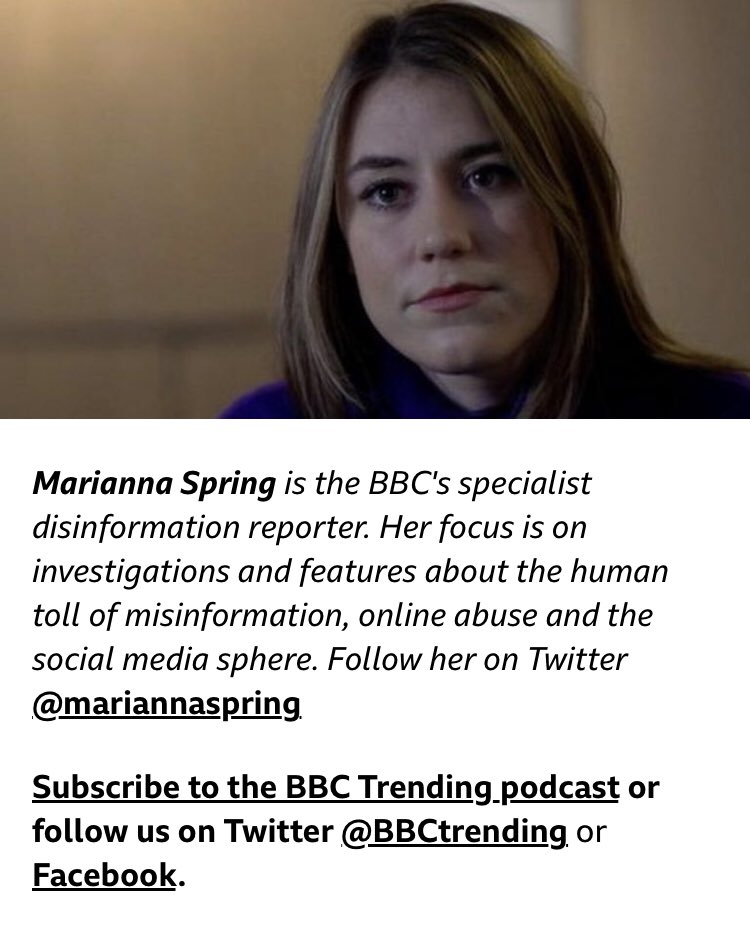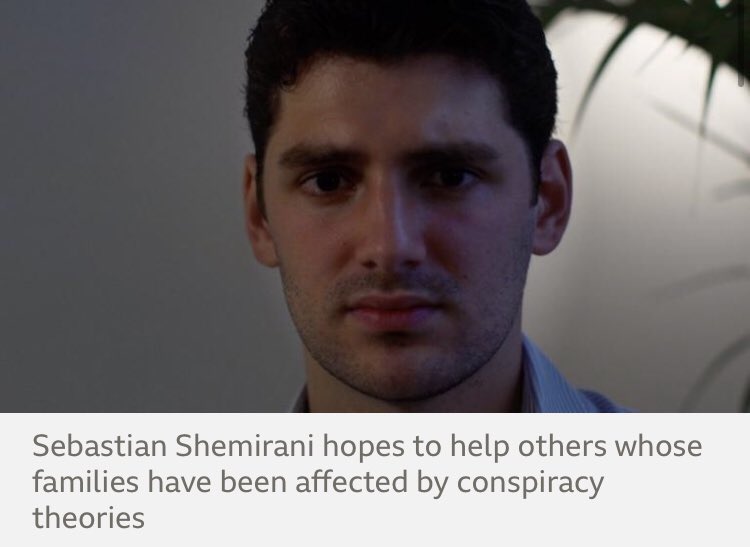NEW  A behind-the-scenes look at my interview with Sebastian Shemirani - whose mum is a leader of Britain’s conspiracy community.
A behind-the-scenes look at my interview with Sebastian Shemirani - whose mum is a leader of Britain’s conspiracy community.
I reflect on what it takes to report on the human cost of conspiracy theories, and how to tackle them with loved ones. https://www.bbc.co.uk/news/blogs-trending-54738471
 A behind-the-scenes look at my interview with Sebastian Shemirani - whose mum is a leader of Britain’s conspiracy community.
A behind-the-scenes look at my interview with Sebastian Shemirani - whose mum is a leader of Britain’s conspiracy community. I reflect on what it takes to report on the human cost of conspiracy theories, and how to tackle them with loved ones. https://www.bbc.co.uk/news/blogs-trending-54738471
Watch the original interview here - where Sebastian spoke exclusively to me about his fears for the impact his mother is having on public health - and their relationship.
Days after this was published, her Twitter account was permanently suspended. https://twitter.com/mariannaspring/status/1320645019661963264?s=21
Days after this was published, her Twitter account was permanently suspended. https://twitter.com/mariannaspring/status/1320645019661963264?s=21
As the BBC's specialist disinformation reporter, I focus on investigations and features humanising the impact of misinformation, conspiracies and abuse online - plus breaking news.
Impossible without the best editor @mwendling + team!
If you have a story get in touch
Impossible without the best editor @mwendling + team!
If you have a story get in touch

Sebastian got in touch with me because he felt a duty to speak out, for the sake of public health, and others whose loved ones going down similar paths.
Conspiracies were his childhood lullabies. He was shown YouTube videos about secret plots and books about "lizard people".
Conspiracies were his childhood lullabies. He was shown YouTube videos about secret plots and books about "lizard people".
Over the course of three hours he detailed how his mum had gained a huge online following by spreading coronavirus falsehoods.
She's denied that coronavirus exists, alleges that the government is planning a mass genocide, and has compared the NHS to Nazi Germany.
She's denied that coronavirus exists, alleges that the government is planning a mass genocide, and has compared the NHS to Nazi Germany.
Her views - broadcast to tens of thousands of online followers and often repeated by larger accounts - threaten to undermine critical public health messages.
But for Sebastian, it was also very personal. His relationship with his mum has broken down.
But for Sebastian, it was also very personal. His relationship with his mum has broken down.
I've spent a lot of time this year covering the human impact of conspiracy theories - from the pro-Trump movement QAnon to the explosion in coronavirus misinformation.
 https://www.bbc.com/news/world-us-canada-53892856
https://www.bbc.com/news/world-us-canada-53892856
 https://www.bbc.com/news/stories-52731624
https://www.bbc.com/news/stories-52731624
 https://www.bbc.com/news/amp/blogs-trending-54440973
https://www.bbc.com/news/amp/blogs-trending-54440973
 https://www.bbc.com/news/world-us-canada-53892856
https://www.bbc.com/news/world-us-canada-53892856 https://www.bbc.com/news/stories-52731624
https://www.bbc.com/news/stories-52731624 https://www.bbc.com/news/amp/blogs-trending-54440973
https://www.bbc.com/news/amp/blogs-trending-54440973
Reporting on conspiracies is not about clamping down on healthy political discussion. There are valid debates about still-developing science.
I cover claims of baseless sinister plots or totally unscientific ideas - plans to implant microchips and kill and enslave billions.
I cover claims of baseless sinister plots or totally unscientific ideas - plans to implant microchips and kill and enslave billions.
Sebastian's was one of thousands of messages I've received from people who fear they are losing loved ones down the rabbit hole of online conspiracy.
And I've been trying to answer that key question that keeps popping up in my inbox: how do you talk to them about it?
And I've been trying to answer that key question that keeps popping up in my inbox: how do you talk to them about it?
First of all, try not to cut the person off. Address the issue as soon as possible - but do it with empathy.
Many of us are feeling very anxious about the pandemic, and conspiracy theories give simple, satisfying answers to a problem that seems overwhelmingly complex.
Many of us are feeling very anxious about the pandemic, and conspiracy theories give simple, satisfying answers to a problem that seems overwhelmingly complex.
Psychologists like Jovan Byford from the Open University tell me that a good strategy is to try to get to the bottom of the person's legitimate concerns and to find out how they are feeling.
You can hear more tips in this radio programme too! https://twitter.com/mariannaspring/status/1320645750351605760
You can hear more tips in this radio programme too! https://twitter.com/mariannaspring/status/1320645750351605760
Depending on how wedded they are to conspiracies, this can be a long process.
"Sit them down and just discuss it for hours until they realise what they're saying is not true," Sebastian suggests. "If you don't nip it in the bud, it will grow and grow."
"Sit them down and just discuss it for hours until they realise what they're saying is not true," Sebastian suggests. "If you don't nip it in the bud, it will grow and grow."
Another tip is to try to figure out where the person is getting their information. Are they quoting a fringe YouTube video (which may have been fact-checked and debunked), or people in the echo chamber of a conspiracy-minded Facebook group?
Present facts and evidence neutrally, the experts say. Rational questions can provoke reflection, and critical thinking. And always listen to people's deeper concerns.
Sebastian suggests asking - why would someone do this? What’s the motive? And how would it even work?
Sebastian suggests asking - why would someone do this? What’s the motive? And how would it even work?
When we put her son's claims to Ms Shemirani, she did not directly respond.
Sebastian's story captured the attention of people across the world. He hopes that other families might be spared the pain that his has suffered.
Sebastian's story captured the attention of people across the world. He hopes that other families might be spared the pain that his has suffered.

 Read on Twitter
Read on Twitter

